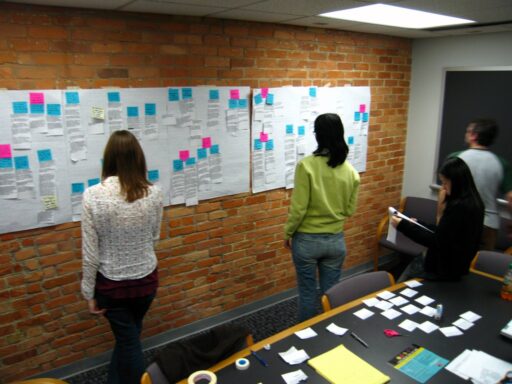Affinity Diagrams are a decision-making technique that helps to organize and sort a large number of ideas, process variables, or concepts into groupings into naturally related groups. Affinity is frequently used to organize the ideas, opinions, or issues generated by brainstorming.
Diagramming is a group activity that uses paper such as sticky notes to physically organize the information. It works best in a workshop environment when participants work together to identify, group and discuss the issues.
Guidelines
- Invite between 4 to 6 participants who are knowledgeable of the topic or issues to be diagrammed
- Break into multiple groups if there are too many participants
- Write one issue on each sticky note. Use phrases or short sentences
- Minimize discussion while sorting, holding discussion until the header cards are composed
How to Conduct an Affinity Sort
- Begin by scheduling a conference room with large walls or windows
- Conduct a brainstorming session on the topic under investigation
- Clarify the list of ideas and write each one on a sticky note
- Randomly place all the sticky notes on the wall, windows, table or flip chart
- Sort the sticky notes into similar groups
- Be sure each participate can see the area where the cards are being placed. Gather around the area as needed
- One person at a time, place one note at a time on the wall
- Read each note aloud while placing the note on the wall
- Create duplicate sticky notes if an idea should be placed more than one group
- If a sticky note doesn’t belong in one group, move it to another
- Continue until all notes have been organized into groups of related items
- When consensus is reached, create header cards with a concise 3-5 word description and post the header card above each group
- Discuss the groupings and try to understand how the groups relate to each other
- Be sure each idea is understandable. Clarify if necessary
- Consider having the groupings reviewed by non-team personnel
- Document the diagram using Visio or similar graphing tool
